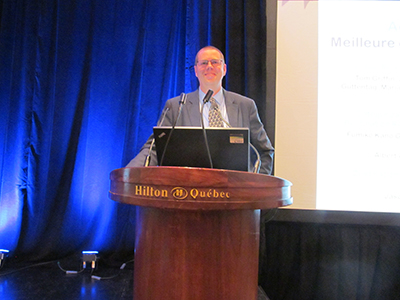
Jason Stienmetz has had an interest in digital visitor experiences and using big data to quantify user tourism behavior, for more than a decade.
Recently, that interest led to an international research award.
Stienmetz is a graduate of Temple University’s PhD program in Business Administration with a concentration in Tourism and Sport. His work earned recognition at the 48th annual Travel and Tourism Research Association (TTRA) international conference, held June 20-22 in Quebec City, Canada. His paper, titled, “Destination Value System Taxonomy for Smarter Tourism Management,” received the conference’s best research paper award.
“It’s always gratifying to win an award like this and receive some recognition for your research work,,” said Stienmetz, a lecturer in tourism at the University of Surrey, in Guildford, England.
“It’s also great to participate in conferences like TTRA, because you receive feedback on how to improve upon the research you have completed and receive different perspectives and synergy that comes out of that process. It has made me excited to continue my work and explore new-but-related areas.”
Stienmetz’s research explored the use of big data to describe how visitors move through tourism destinations and, subsequently, correlating those movements with visitor spending. The idea, Stienmetz said, allows academics and destination marketers to gain a better understanding of a destination’s structure, how to manage a destination and achieve structures that are optimal for competitiveness and generating more tourism revenue.
The study incorporated the use of what Stienmetz called “volunteered geographic information” from more than 4 million photographs shared via photo-based social network Flickr to “calculate destination value system network metrics” throughout the state of Florida.
“While previous studies have clearly established the relationships between destination network structures and visitor expenditures, it remains less understood how these characteristics vary between destinations and over time,” Stienmetz said.
A trip to Costa Rica as a volunteer of the United States Peace Corps inspired Stienmetz’s interest in this specific research area. He and his now wife, Bobbi, visited the Central American country after completing their undergraduate work at the University of Wisconsin. Their aim, he said, was to support local entrepreneurs and conduct social work with the region’s children and parents.
“It was interesting to see tourism’s effect on the community—both for good and bad,” Stienmetz said. “There was new opportunity, more money, but also the downside and the dark side of tourism. I have tried to understand the big picture ever since. I also have interest in sustainability — the environmental, ecological and social impacts of destination, the residents’ quality of life and how we can measure and manage them.”
Stienmetz successfully defended his dissertation in Temple’s PhD program in May 2016. The program builds upon the strength of two schools — the Fox School of Business, which houses the doctoral program and delivers its core curriculum and the School of Sport, Tourism and Hospitality Management (STHM), which provides the faculty with whom its doctoral students work closely within their concentration area.
“I am grateful to STHM’s Dr. Wes Roehl, who served as the chair of my dissertation and Dr. Yang Yang and Dr. Michael Ok for their support on the dissertation committee,” said Stienmetz, who also thanked University of Florida’s Dr. Daniel Fesenmeier, a former STHM faculty member, for his work as an external committee member. “I wouldn’t be where I am today without Temple University.”